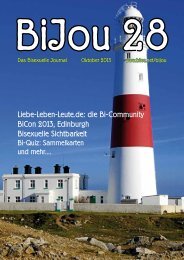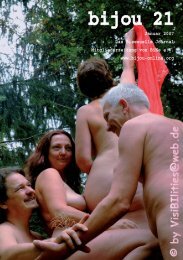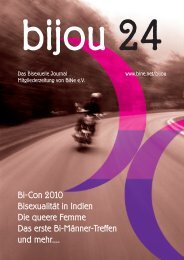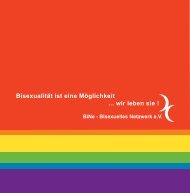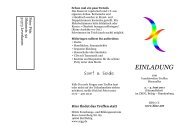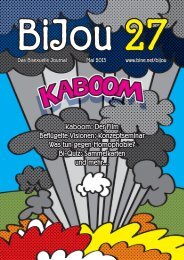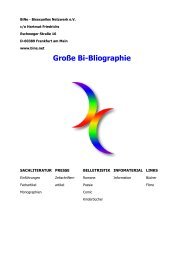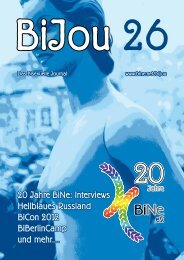BiJou 26 - BiNe Bisexuelles Netzwerk eV
BiJou 26 - BiNe Bisexuelles Netzwerk eV
BiJou 26 - BiNe Bisexuelles Netzwerk eV
You also want an ePaper? Increase the reach of your titles
YUMPU automatically turns print PDFs into web optimized ePapers that Google loves.
on to the biographical situation. Problems might<br />
arise due to a fragility of identity since it’s primarily<br />
secured by active bisexual practise. This<br />
could lead to doubts on one’s identity by oneself<br />
or by others. The identity construction of bisexuality<br />
as a fact, as cited in the second case, is<br />
for the most part a naturalised identity construction.<br />
Here one can distinguish between the<br />
two cases, one which is determined by a continual<br />
embedding of bisexuality and one which<br />
is characterised by a biographical break. In the<br />
first case bisexuality is a natural part of the body<br />
and fits – without having any specific chronological<br />
structure – harmonically into a biographical<br />
whole. In case of a biographical break,<br />
bisexuality is usually something that breaks into<br />
the life story as some sort of “instinctual drive”<br />
or “force of nature” – according to interviewees<br />
– and needs to painstakingly be integrated<br />
into one’s life follow-ing this biographical break.<br />
<strong>BiJou</strong> <strong>26</strong><br />
32<br />
One resource in both variants is a stable identity.<br />
Problematic could be – especially in cases of a<br />
biographical break – a feeling of powerlessness<br />
since bisexuality is viewed as a force of nature<br />
and not something that one has any power over<br />
or can control.<br />
These – for now quickly schematically represented<br />
– strategies of biographical embedding<br />
of bisexual identity clearly show that the monosexual<br />
order has taken its toll. If bisexuality is<br />
experienced as a process – more as a narrative,<br />
as Garber would say – one risks a brittle bisexual<br />
identity as it lifts itself off from the established<br />
sexual identity categories. If it’s classified as a<br />
fact of nature one might deal with a perceived<br />
powerlessness as well as the naturalisation of bisexuality<br />
in which it becomes equivalent to all<br />
other sexual identity categories. So even in these<br />
biographical constructions of bisexuality its<br />
paradoxical position in the social order of sexuality<br />
is clearly expressed. These different ways of<br />
biographically dealing with its paradoxical position<br />
lead to the political question on whether<br />
bisexuality should be established as a recognised<br />
identity category or to insist on the narrative<br />
and processual nature of bisexuality. It remains<br />
exciting how bisexuality will transform as practise,<br />
desire, and identity under the conditions of<br />
the transformation of modern gender and sexuality<br />
or-ders. <strong>BiNe</strong> e.V. will surely continue to be<br />
a part of the process. On the part of our project<br />
group we also wish <strong>BiNe</strong> continued success and<br />
send our congratulations for the 20 th anniversary.<br />
X-Files Star Gillian Anderson comes out<br />
This mother of three came out April this year in her interview<br />
with Out magazine as she told of lesbian relationships during her<br />
younger years.<br />
http://tinyurl.com/gilliancomesout<br />
Bibliography<br />
Foucault, M. (1983): Der Wille zum Wissen. Sexualität<br />
und Wahrheit I. Frankfurt am Main: Suhrkamp.<br />
Fritzsche, B. (2007): Das Begehren, das nicht<br />
eins ist. Fallstricke beim Reden über Bisexualität.<br />
In: Hartmann, Jutta (Eds.): Empirische Studien<br />
zu Geschlecht, Sexualität und Macht. Wiesbaden:<br />
VS, pp. 115-131.<br />
Garber, M. (2000): Die Vielfalt des Begehrens.<br />
Bisexualität von Sappho bis Madonna. Frankfurt/M.<br />
Giddens, A. (1993): Wandel der Intimität. Sexualität,<br />
Liebe und Erotik in den modernen Gesellschaften.<br />
Frankfurt a. M.: Fischer.<br />
Haeberle, E. J. (1994): Bisexualitäten – Geschichte<br />
und Dimensionen eines modernen wissenschaftlichen<br />
Problems. In: Haeberle, Erwin<br />
J./ Gindorf, Rolf (Eds.): Bisexualitäten. Ide-ologie<br />
und Praxis des Sexualkontaktes mit beiden<br />
Geschlechtern. Stuttgart, Jena, New York: Gustav<br />
Fischer Verlag, pp. 1-40.<br />
Jackson, S./ Scott, S. (2010): Is Heterosexuality<br />
still Compulsory? In: Theorizing Sexuality.<br />
Berkshire/New York: Open University Press, pp.<br />
74-100.<br />
Klesse, C. (2007): Weibliche bisexuelle Nicht-Monogamie,<br />
Biphobie und Promiskuitätsvor-würfe.<br />
In: Hartmann, Jutta (Eds.): Empirische Studien<br />
zu Geschlecht, Sexualität und Macht. Wiesbaden:<br />
VS, pp. 291-307.<br />
Rosenthal, G., 1995: Erlebte und erzählte Lebensgeschichte.<br />
Gestalt und Struktur biografischer<br />
Selbstbeschreibung. Frankfurt; New York:<br />
Campus.<br />
<strong>BiJou</strong> <strong>26</strong><br />
33<br />
Schmidt, G. (2000): Spätmoderne Sexualverhältnisse.<br />
In: Schmerl, Christiane/Soine, Stefanie/<br />
Stein-Hilbers, Marlene/Wrede, Brigitta (Hrsg):<br />
Sexuelle Szenen. Inszenierung von Geschlecht<br />
und Sexualität in modernen Gesellschaften. Opladen:<br />
Leske + Budrich, pp. <strong>26</strong>8-279<br />
Schmidt, G. (2006): Spätmoderne Beziehungswelten:<br />
Report über Partnerschaft und Sexualität<br />
in drei Generationen. Wiesbaden: VS Verlag für<br />
Sozialwissenschaften<br />
Seidman, S. (2009): Critique of Compulsory Heterosexuality.<br />
Sexuality Research and Social Policy.<br />
In: Journal of NSRC. 6 (1), pp. 18-28<br />
Sigusch, V. (2011): Gibt es Bisexuelle tatsächlich?<br />
In: Auf der Suche nach der sexuellen Freiheit.<br />
Über Sexualforschung und Politik. Frankfurt/<br />
M. [inter alia]: Campus, pp. 112-115.<br />
Contact<br />
DFG project: “Die soziale Ordnung des Sexuellen<br />
– Die erzählte Lebensgeschichte von Bisexuellen”<br />
(“The social order of sexuality – told life<br />
stories of bisexuals”).<br />
Institute of Sociology<br />
TU Darmstadt<br />
Residenzschloss<br />
D - 64283 Darmstadt<br />
Tel.: 06151-16-3<strong>26</strong>6<br />
Fax: 06151-16-6035<br />
Director: Prof. Dr. Martina Löw<br />
Research assistance: Eva Kemler<br />
(kemler@stadtforschung.tu-darmstadt.de)<br />
and Kim Ritter<br />
(ritter@stadtforschung.tu-darmstadt.de)



